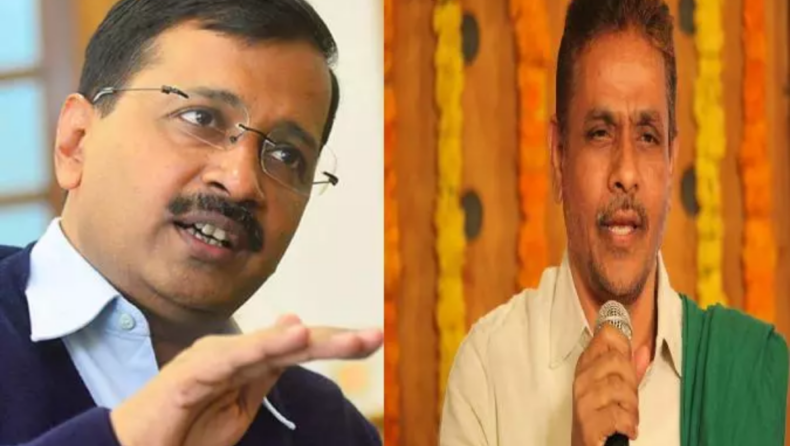Farmer leader Kodihalli Chandrashekar, who leads the Karnataka Rajya Raitha Sangha (KRRS) group, joins the Aam Aadmi Party (AAP) on Thursday in Bengaluru, in the presence of the party’s convenor and Delhi Chief Minister Arvind Kejriwal.
Arvind Kejriwal, the convener of the Aam Aadmi Party and Delhi Chief Minister, attended a farmers’ conference in Bengaluru on Thursday ahead of Karnataka’s Assembly elections next year.
Kejriwal had been invited by the Karnataka Rajya Raitha Sangha (KRRS) faction, led by Kodihalli Chandrashekar, to launch the convention at National College Grounds in Basavanagudi. It is being held to demand that the state government repeal revisions to the land reform and APMC Acts and a legislative guarantee for MSP.
Demands
The event happened during a farmers’ convention in Bengaluru, ahead of next year’s Assembly elections. The convention is being organized to demand that the state government retract amendments to the land reforms Act and the APMC Act and a statutory guarantee for a minimum support price.
They would also like MSP to be covered by a statutory guarantee. “While the demand for withdrawal is the most pressing problem, the government has been accused of wanting a 40% commission, and the opposition has failed to respond. “The Opposition parties are just like the BJP,” Kodihalli Chandrashekar stated.
Arvind Kejriwal in the Conference

The Aam Aadmi Party (AAP) would form a government in Karnataka as it did in Delhi and Punjab, Chief Minister of the nation’s capital Arvind Kejriwal said on Thursday.
“We, the common people, were challenged to get into politics when we demanded law against corruption. We formed a political party. Our first and second governments were established in Delhi and Punjab, respectively. “We will now build our next government in Karnataka,” the AAP head made it clear, addressing a farmers’ rally organized by several farmers’ organizations led by the Karnataka Rajya Raitha Sangha (KRRS).
When asked about the alleged corruption in Karnataka, Kejriwal replied that the previous Congress administration was known as the “20 percent commission government” and that the present BJP government was known as the “40 percent commission government.” Kejriwal mentioned a recent suicide by a civil contractor who accused Karnataka Rural Development and Panchayat Raj Minister K S Eshwarappa of demanding 40% commission in a claimed suicide note.
“Delhi has a government with no commission because it is an honest, hardcore government.” “Not a single paise is accepted as a bribe,” Kejriwal stated.
In response to the riots in Delhi and other parts of Karnataka, Kejriwal said that all of the country’s rowdies, rogues, uncouth, and corrupt are associated with ‘one political party.’
People should vote for “them” if they want riots, but the AAP should be voted for if they need schools, hospitals, free power, transportation, and water.
The Chief Minister said that the AAP is unaffected by riots because its members are peaceful, patriotic, and honest people who want schools, hospitals, roads, drinkable water, power, and accessible transportation.
The Chief Minister stated that farmers’ conditions had not changed even after 75 years of independence.
Farmers’ children do not want to join politics, although agriculture employs 45 percent of the population.
He praised farmers for their widespread protests, which compelled the Centre to repeal the three agricultural regulations 13 months after they were enacted.
In welcoming Kodihalli Chandrashekar to the AAP, he stated that if elected to power, the party would revolutionize the lives of farmers. He urged farmers to join the AAP to rid Karnataka of corruption.
Addressing the gathering, Kodihalli Chandrashekar stated that the KRRS’s purity and sanctity would be preserved even as the organization works around the clock to guarantee that the AAP comes to power in Karnataka.
Chandrashekar believes neither the BJP, the Congress, nor the JD(S) is viable alternatives for state farmers. He urged farmers across the state to support the AAP, providing an alternative to the status quo.
Published By: Aman Gupta
Edited By: Vanshika Sahu












